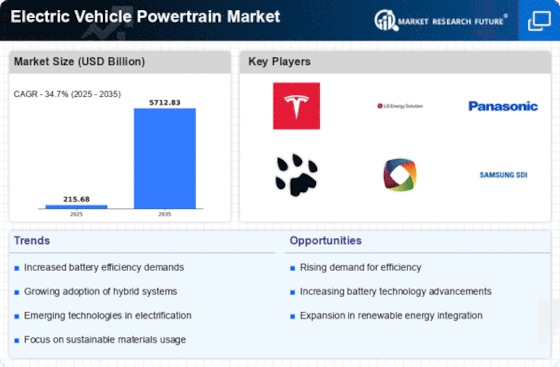Top Industry Leaders in the Electric Vehicle Powertrain Market
 The automotive landscape is undergoing a seismic shift with the advent of the electric vehicle (EV) revolution, and at its core is the powertrain – a sophisticated ensemble of electric motors, batteries, inverters, and ancillary components propelling these environmentally friendly machines. The global market for EV powertrains is evolving into a fiercely contested battleground, witnessing a clash between industry stalwarts and agile startups armed with disruptive technologies. In this dynamic domain, comprehending the competitive landscape becomes imperative for those seeking success.
The automotive landscape is undergoing a seismic shift with the advent of the electric vehicle (EV) revolution, and at its core is the powertrain – a sophisticated ensemble of electric motors, batteries, inverters, and ancillary components propelling these environmentally friendly machines. The global market for EV powertrains is evolving into a fiercely contested battleground, witnessing a clash between industry stalwarts and agile startups armed with disruptive technologies. In this dynamic domain, comprehending the competitive landscape becomes imperative for those seeking success.
Key Players and Their Strategies: Orchestrating the Symphony
Prominent entities shaping the EV powertrain market include:
- ZF Friedrichshafen AG (Germany)
- EPT Co. Inc. (South Korea)
- WEG (Brazil)
- Bonfiglioli Riduttori S.P.A (Italy)
- IET S.p.A. (Italy)
- Automation Tooling Systems Inc. (Canada)
- GKN PLC (UK)
- NXP Semiconductors (the Netherlands)
- Robert Bosch GmbH (Germany)
- BorgWarner Inc. (US)
- Continental AG (Germany)
- AVL List GmbH (Austria)
- Mitsubishi Electric Corp (Japan)
- Magna International Inc. (Canada)
- Dana Incorporated (US), and others.
Traditional Automakers: Capitalizing on existing manufacturing prowess and brand recognition, traditional automakers are scaling up EV production. Examples include Volkswagen Group's MEB platform and General Motors' Ultium platform, enabling standardized and rapid deployment of diverse EV models across brands.
Tier 1 Suppliers: Companies like Bosch, Continental, and Denso, traditionally supplying components to internal combustion engine (ICE) vehicles, are actively developing and supplying EV powertrain components. Their objective is to maintain relevance in the evolving market by leveraging vast engineering expertise and established supplier networks.
EV-Focused Startups: Leading the charge for innovation are startups like Tesla, Rivian, and Lucid Motors. Their emphasis on performance, range, and software integration is setting a new industry benchmark.
Technology Giants: The likes of Apple and LG are entering the arena, bringing their technological expertise and consumer ecosystems to the table. Their potential entry could reshape the competitive landscape by introducing new user experiences and integration possibilities.
Factors Influencing Market Share: Navigating the Course
Several factors play a pivotal role in determining market share in the EV powertrain sector:
-
Technology Leadership: Offering superior range, efficiency, and charging speeds translates directly to market share gains. Companies actively invest in battery research, motor development, and intelligent powertrain management systems. -
Cost Optimization: Striking a balance between performance and affordability is crucial for widespread EV adoption. Players are focusing on modular designs, reducing production complexity, and leveraging economies of scale to bring down costs. -
Vertical Integration: Controlling key components like batteries and motors can provide competitive advantages in terms of performance, cost, and supply chain security. However, it requires careful strategic decisions to balance investment with flexibility. -
Regional Dynamics: Government policies, charging infrastructure development, and consumer preferences vary significantly across regions. Adapting platforms and offerings to meet these diverse needs is crucial for global success.
Emerging Trends and Disruptive Technologies: Paving the Way Forward
Several trends and technologies are emerging, promising to reshape the competitive landscape:
-
Solid-State Batteries: These batteries offer higher energy density, faster charging, and improved safety, holding immense potential for revolutionizing EV range and performance. Major players are actively investing in research and development to be at the forefront of this game-changing technology. -
Wireless Charging: Advancements in magnetic resonance and inductive charging technologies are paving the way for a future where EVs seamlessly refuel wirelessly, eliminating the need for physical plugging-in. -
Vehicle-to-Grid (V2G) Technology: Enabling EVs to act as mobile energy storage units, V2G allows bi-directional flow of electricity between vehicles and the grid. This technology paves the way for improved grid stability, peak demand management, and potential revenue generation for EV owners.
Overall Competitive Scenario: Navigating the Battlefield
The EV powertrain market is a dynamic and rapidly evolving battlefield. Established players leverage existing strengths, while startups and new technologies push the boundaries of innovation. Balancing performance, cost, and regional adaptations, alongside embracing transformative technologies like solid-state batteries and V2G, are key success factors. The next few years will be critical in determining the ultimate victors in this high-stakes race, shaping the future of sustainable mobility.
Industry Developments and Latest Updates:
ZF Friedrichshafen AG (Germany):
-
October 26, 2023: Launched a new 8-speed hybrid transmission specifically designed for electric and hybrid powertrains. (Source: ZF Press Release)
EPT Co. Inc. (South Korea):
-
September 20, 2023: Unveiled a new high-efficiency axial flux EV motor with 95% efficiency. (Source: EPT Co. website)
WEG (Brazil):
-
December 8, 2023: Signed an agreement with Stellantis to supply electric motors for light commercial vehicles in South America. (Source: WEG Press Release)
Bonfiglioli Riduttori S.p.A (Italy):
-
December 12, 2023: Announced collaboration with AVL List on the development of innovative transmission systems for heavy-duty EVs. (Source: Bonfiglioli Press Release)
IET S.p.A. (Italy):
-
October 27, 2023: Presented a new line of silicon carbide - inverters for high-power EV chargers at the Battery Show Europe. (Source: IET website)










